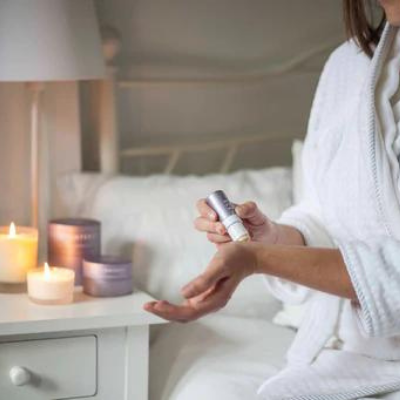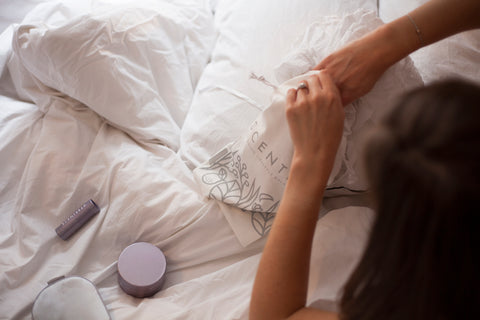
The majority of us have suffered from lack of sleep at some point during our lifetime. And when that happens, it’s so frustrating. All you want to do is sleep, yet your mind just won’t switch off, a child wants to get into bed with you, the dog barks at an ungodly hour and wakes you up, or worse still you suffer the affliction of a partner that heavily snores.
Sometimes it can feel as if everything is conspiring against you when it comes to sleep. You spend the night clock-watching and come the morning, you feel utterly exhausted, demotivated, and downright stressed. And guess what? You can’t sleep the next evening either.
Why is Sleep Important?
Sleep is unbelievably important because it’s the time when our mind and body rests and recovers. It keeps us healthy and is as important as nutrition and exercise. Unfortunately, sleep is often neglected and deprioritised, however. When we don’t get enough sleep, we really begin to feel it.
More worryingly, ongoing lack of sleep has also been linked to many long-term health issues including weight gain, lower immunity, longer recovery from illness, heart disease and increased likelihood of anxiety and depression.
Poor sleep impacts on every aspect of life, affecting our relationships, concentration, and the ability to function at work too, underlining the relevance of this key pillar of health. Getting better sleep should, therefore, be prioritised before it does irrefutable damage.

Natural Ways to Help Sleep
- Reset Your Circadian Rhythm
The important thing to know is that our body has circadian rhythms that go back to when we were cave dwellers. During those days, we would be awoken by the sun and then later in the day, when the sun began to go down, our body would naturally begin to wind down and prepare for sleep.
These days, there are all sorts of disruptions to our natural circadian rhythm like artificial lights, black out curtains, work shift patterns, television and of course, smartphones and social media. One of the best things we can do is get back in sync with our circadian rhythm. For instance, using a sunset and sunrise alarm clock to mimic the sun coming up and going down rather than the sudden noise of a jarring phone alarm.
As soon as you get up, get some sunlight onto you whether that’s opening the curtains while you dress and get ready, eating breakfast in a sunny room or going outside for a quick walk or to do something in the garden.
The blue light from smartphones can have a big impact on our natural inclinations too, so break the habit by keeping your phone in a different room overnight.
- Aromatherapy and Sleep
Many people like to use natural sleep remedies to help them drift into a deep sleep. One of the most popular of these is aromatherapy. Why? Well, it’s all to do with the fact that scent travels up to the brain’s limbic system (via the olfactory nerve) and is believed to have an impact not only on mood and mindset, but also on some of the body’s unconscious physiological functions, like breathing and heart rate.
We love the Scentered SLEEP WELL blend, which promotes a deeply restorative sleep. Light a SLEEP WELL Home Aromatherapy Candle during the evening to create the perfect ambiance for winding down and sleeping well. It’s a sophisticated, modern, floral, oriental combination which harnesses the immensely therapeutic benefits of Lavender, Chamomile, Palmarosa and Ho Wood to quiet the mind, whilst balancing them with stress relieving Bois de Rose and Geranium.
Roughly 15 minutes before bedtime, apply the SLEEP WELL Wellbeing Ritual Aromatherapy Balm and inhale deeply its gorgeous scent three times. You’ll be amazed at how easily you drift off and how well-rested you feel when you awake. For the ultimate bedtime ritual, opt for the I Want to Sleep Well Set which contains both!

- Download Your Day
Bedtime is often used to process thoughts about the day but in fact this process needs to start a lot earlier in the day if we want to get a reasonable night of sleep.
Meditation during the day allows you time and space to download some of your day ahead of bedtime. Another method is to write a journal before you go to bed so that you ‘download’ your day and bring an element of closure prior to rolling over to go to sleep.
- Bedtime Routine
A regular bedtime routine is helpful because it sends signals to the brain that it’s time to wind down and prepare for sleep. Everyone’s different but the main point is do things that help calm your mind and relax your body.
That could be having a soothing bath, listening to a meditation app, reading for half an hour, having a cup of chamomile tea or lighting an aromatherapy candle during the evening. It might be one thing that you do without fail every evening or you could build several things into your bedtime routine.
The most crucial thing is consistency because that’s what builds cues in your brain. So, the more you do your bedtime routine, the quicker your brain recognises it and the sooner you’ll feel sleepy.

5. Create a Restful Sleep Environment
It’s a useful exercise to check that your bedroom promotes sleep. In fact, there’s much to be said for clean, comfortable bedding and having a pillow that gives your head and neck the right level of support.
Keeping a TV, smartphone, laptop, or having a bright light in the bedroom all send the wrong signals to our brain. Instead, keep tech elsewhere and install low-level soft lighting instead.
It might also surprise you to hear that The Sleep Foundation recommends having a cooler bedroom at 18.3 degrees Celsius for sleep! So, if you haven’t already done so, now’s the time to conduct a bedroom audit.
We would love to hear about your mental wellness journey. You can also keep in touch via our Instagram @iamscentered or sign up to our newsletter for updates, news and offers.
